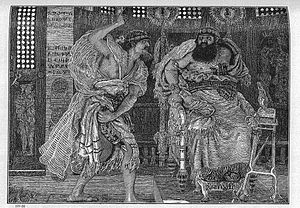| Revision as of 11:16, 26 March 2020 editRuyter (talk | contribs)Extended confirmed users, Rollbackers5,683 editsm →Biblical narrative← Previous edit | Revision as of 11:17, 26 March 2020 edit undoRuyter (talk | contribs)Extended confirmed users, Rollbackers5,683 editsm →EtymologyNext edit → | ||
| Line 31: | Line 31: | ||
| == Etymology == | == Etymology == | ||
| ] is unknown. | ] is unknown.{{fact}} | ||
| == See also == | == See also == | ||
Revision as of 11:17, 26 March 2020
For other uses, see Ehud (given name).| Ehud | |
|---|---|
 Illustration by Ford Madox Brown of Ehud assassinating the Moabite king Eglon Illustration by Ford Madox Brown of Ehud assassinating the Moabite king Eglon | |
| Occupation | Second Judge of Israel |
| Predecessor | Othniel |
| Successor | Shamgar |
Ehud ben‑Gera (Template:Lang-he-n, Tiberian ʾĒhûḏ ben‑Gērāʾ) is described in the biblical Book of Judges as a judge who was sent by God to deliver the Israelites from Moabite domination. He is described as being left-handed and a member of the Tribe of Benjamin.
Biblical narrative
According to Judges 3:12–30, Ehud was sent to the Moabite King Eglon on the pretext of delivering the Israelites' annual tribute. He made a double-edged shortsword about a cubit (eighteen inches) long, useful for a stabbing thrust. Being left-handed, he could conceal the sword on his right thigh, where it was not expected. Once they met, Ehud told Eglon he had a secret message for him. Eglon dismissed his attendants and allowed Ehud to meet him in private. Ehud said, "I have a message from God for you", drew his sword, and stabbed the king in his abdomen. After Ehud stabbed the king, the end of Judges 3:22 reads in Hebrew vayyetze hap-parshedonah, a phrase of uncertain meaning. The sword disappeared into the wound and Ehud left it there. He locked the doors to the king's chamber and left.
Eglon's assistants returned when too much time had elapsed and found the doors locked. Assuming that he was relieving himself, they waited "to the point of embarrassment" before unlocking the door and finding their king dead.
Ehud escaped to the town of Seraiah in Ephraim. He sounded the shofar and rallied the Israelite tribes, who killed the Moabites, cutting off the fords of the Jordan River, and invaded Moab itself, killing about 10,000 Moabite soldiers.
After the death of Eglon, the narrative reports that there was peace in the land for 80 years.
Biblical criticism
Coogan argues that the story of Ehud was probably a folk tale of local origin that was edited by the Deuteronomistic historians. The Deuteronomistic historians “incorporated a variety of previously existing sources into their narrative of life in early Israel” and the story of Ehud is one such example of a “previously existing source”, that has been edited to include “the cyclical pattern” typical of the stories of the major judges. This pattern consists of apostasy, hardship, crying out to the Lord, and rescue and it is clearly present in the tale of Ehud: apostasy and hardship occur in Judges 3.12, “The Israelites again did what was evil in the sight of the Lord; and the Lord strengthened King Eglon of Moab against Israel.” The “crying out to the Lord” and the subsequent rescue are evident in Judges 3.15: “but when the Israelites cried out to the Lord, the Lord raised up for them a deliverer, Ehud son of Gera.” The rather lively and glorious tale is ended with the refrain of “and the land had rest 80 years,” (Judges 3.30) an editorially constructed ending typical to Gideon and other “major” judge stories in the book of Judges. He was the second judge chosen by God.
Barry Webb sees Ehud as "directed by the Lord, who used this most unlikely hero to bring deliverance to his undeserving but desperate people".
Etymology
The etymology of Ehud's name is unknown.
See also
Notes
- The word may be an architectural term, indicating the area into which Ehud moved as he left the king and began his escape. Some take the noun as “back”, and understand “sword” (from the preceding clause) as the subject, and translate “the sword came out his back”. The American Standard Version says "it came out behind" and also provides the variant, "he went out into the antechamber" (ASV version of Judges 3:22). The Cambridge Bible for Schools and Colleges regards this wording as "based upon a guess of the Septuagint (τὴν προστάδα)", whose writers may, according to Ellicott, have been "consulting propriety", whereas many translations refer to excrement coming out of the body. The King James Version uses the euphemism of "dirt". Young's Literal Translation, more cryptically, states that "it goeth out at the fundament".
References
- "Judges 3:12-28 (King James Version)". BibleGateway.com.
- Robert B. Chisholm Jr. (14 November 2013). A Commentary on Judges and Ruth. Kregel Academic. p. 186. ISBN 978-0-8254-2556-1.
- Judges 3:30
- ^ Coogan, M., A Brief Introduction to the Old Testament: The Hebrew Bible in its Context, Oxford University Press: Oxford, 2009. pp.176.
- ^ Nelson, Richard D. Harper Collins Study Bible, Revised Edition. HarperCollins: New York, 2006. p. 352.
- Nelson, Richard D. Harper Collins Study Bible, Revised Edition. HarperCollins: New York, 2006. pp.350.
- Inter-Varsity Press New Bible Commentary p.269
External links
- Book of Judges article of the Jewish Encyclopedia
- The story of Ehud retold for children (text and audio)
| Ehud Tribe of Benjamin | ||
| Preceded byOthniel | Judge of Israel | Succeeded byShamgar |